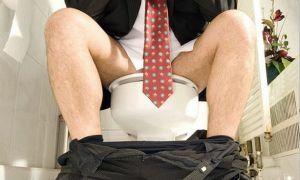 Unpleasant soreness during bowel evacuation causes a person to panic, especially if he experiences them periodically.
Unpleasant soreness during bowel evacuation causes a person to panic, especially if he experiences them periodically.
As a rule, the pains are stinging with a simultaneous burning sensation, which is caused by irritation or trauma to the rectal mucosa. This is due to the fact that in the lower part of the intestine there are many blood vessels and nerve endings.
Various factors can provoke the onset of pain syndrome.
Contents
- Concomitant symptomatology
- Revealing the true cause is not easy
- If the anal passage is cracked
- This painful hemorrhoid. ..
- Inspection and diagnosis
- What should I do if I have pain?
- Methods of therapy
- In the risk zone - pregnant women
- What can complicate the patient's condition?
- Prevention measures
Concomitant symptomatology
As usually pain during defecation and after it appears due to intestinal and anorectal diseases, the following symptoms can simultaneously occur:
- changes in the consistency and color of stools, the appearance of fetid smell from them;
- meteorites with and without flotation.
- cramping abdominal pain;
- sensation of a foreign object in the rectum;
- secretion of mucus, pus or blood from the anal canal;
- presence of blood in the stool;
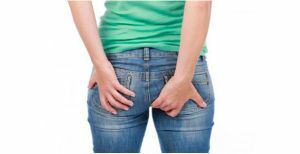
- appearance of crusts or bubbles around the anus;
- itching in the anus;
- weight loss;
- fast fatigue;
- increased body temperature.
Revealing the true cause is not easy
Pain in the anus and in the rectum during defecation and after bowel movement may cause such factors and diseases:
- spicy dishes;
- genital warts;
- irritable bowel syndrome;
- sexually transmitted diseases accompanied by proctitis;
- chronic intestinal inflammations, such as ulcerative colitis, Crohn's disease;
- non-observance of personal hygiene of the interannual area;
- the presence of a foreign object in the rectum;
- is a malignant neoplasm of the intestine that can block the lumen of the intestine or the anus;
- fecal incontinence;
- indigestion or vice versa constipation;
- inflammation of the rectum and sigmoid colon after irradiation;
- anal eczema;
- pararectal abscess, causes pain and blood during defecation, also the patient will have a high fever, chills, deterioration of overall well-being, sometimes swelling of the lower extremities, which are constantly progressing.
Still, more often pain during defecation causes hemorrhoids, as well as acute and chronic anal fissures.
If the anal passage of the
has cracked. In acute cracks in the anus, pain is severe, but short-lived. They are observed or only when bowel is emptied or within a quarter of an hour after it.
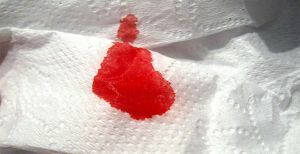 In this case, as a rule, the painful site is located on the back wall of the rectum.
In this case, as a rule, the painful site is located on the back wall of the rectum.
In addition, acute anal cracks strongly expressed spasm of anal pomace, resulting in defecation is difficult, stools acquire a solid consistency and injure the mucosa of the rectum. All this is accompanied by pain and bleeding during defecation.
In the absence of treatment of anal fissures, they become chronic. In this case, the pains become more prolonged, can be not only with bowel movements, but also with a change in the position of the body.
They impair the patient's quality of life, patients become irritable, suffer from insomnia. Spasm of the sphincter is not as pronounced as in the acute course of the disease.
This painful hemorrhoids. ..
The causes of pain in this case can be: 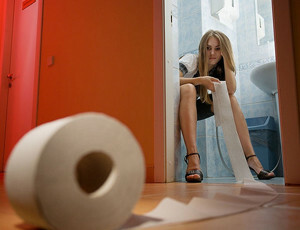
- , the anal sphincter of the pricked node;
- thrombosis of hemorrhoids;
- infectious-inflammatory processes in the anal zone;
- traumatizing the calves of hemorrhoidal cones, especially with problems with defecation;
- anal fissures, as a complication of hemorrhoids.
Inspection and diagnosis
Before the diagnosis, the attending physician must collect a complete history:
- when pains occur and for how long they last;
- what kind of pain, their intensity;
- what other symptoms bother the patient;
- is there a chronic disease of the intestine.
Based on the collected history, the doctor will appoint further examinations.
First, he will conduct a visual examination of the anorectal zone, which allows you to detect hemorrhoidal cones, anal fissures, inflammatory phenomena in the rectum. Using a digital rectal examination, the proctologist can detect cones and wounds of the perianal zone.
For further diagnosis, the doctor may prescribe:
- rectoscopy;
- colonoscopy;
- taking a rectal smear;
- biopsy of rectal cells;
- total blood test.
In addition to the proctologist, depending on the clinical picture, the patient may be examined by a gynecologist, urologist, surgeon, gastroenterologist, oncologist.
What should I do if I have pain?
If you have pain in the rectum during defecation, do not self-medicate, take any analgesic remedies so as not to lubricate the clinical picture.
At the slightest discomfort in the rectum should immediately contact a specialist.
Methods of therapy
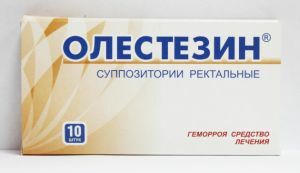 Since the pain during defecation and after it is just a symptom of the underlying disease, the first thing to do is to treat it. With hemorrhoids for the period of treatment, the menu removes all the spicy and salty, and also exclude alcohol.
Since the pain during defecation and after it is just a symptom of the underlying disease, the first thing to do is to treat it. With hemorrhoids for the period of treatment, the menu removes all the spicy and salty, and also exclude alcohol.
For pain relief, ointments and suppositories with lidocaine or benzocaine are prescribed, for example, Proctosan, Ultraprotect, Procto-gliwenol, Relief Advance. To remove a spasm of the anal sphincter will help suppositories with papaverine.
For the healing of the cracks in the anus, candles with sea buckthorn oil, Olesesin, ointment of Dr. Pantenol are suitable.
It is also very important to get rid of constipation. To do this, you will have to follow a diet. You need to consume more plant foods rich in fiber. Perhaps the appointment of laxatives, for example, Normase. At later stages of hemorrhoids, surgical operations are indicated.
Approximately the same scheme of treatment of anal fissures.
In the risk zone - pregnant women
Quite often pain during defecation in women is observed during pregnancy. This is due to the fact that the constantly growing uterus presses on the rectum, quite often in this period of the patient suffer from constipation. 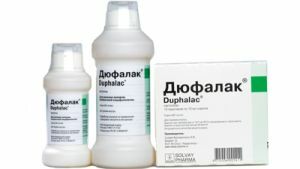
But, as is known, not all drugs are allowed to be used to treat women in the situation. To eliminate spasm of sphincter and relief of pain in pregnant women, suppositories with papaverine can be used.
Sea-buckthorn candles are allowed as wound healing drugs. Well, it's over, you need to soften the stool, and normalize the stool. From medicamental laxatives for the treatment of this category of citizens is permitted, for example, Dufalac syrup.
How can a patient's condition worsen?
Pain when you visit the toilet leads to the fact that the patient begins to fear the act of defecation, tries to delay it.
As a result, the stool masses are compressed, which leads to constipation, to traumatizing the intestinal mucosa during the passage of feces along it.
All this only strengthens the symptoms of a provoking disease, the pain is associated with bleeding, which can lead to anemia. Open wounds are a good medium for the development of infection.
Prevention measures
It is very important to ensure that bowel evacuation is regular, and stools have a soft consistency.
 To do this, you must follow a diet, replace the usual bread with wholemeal bread, eat flax and sunflower seeds, dried fruits, lots of vegetables and fruits.
To do this, you must follow a diet, replace the usual bread with wholemeal bread, eat flax and sunflower seeds, dried fruits, lots of vegetables and fruits.
But vegetable food should either boil al-dente or passer, so it retains vitamins and at the same time they do not burden the intestines unlike raw vegetables and fruits.
It is imperative to drink up to 2 liters of clean water a day, which also helps to soften the stool. Do not use toilet paper with fragrances and dyes, keep intimate places clean.
If you have even minor pain at the time of defecation, you should not postpone the visit to the doctor. After all, the earlier the examination is completed, the diagnosis is established and the treatment is prescribed, the faster all the symptoms will pass and it will be possible to return to everyday affairs.
